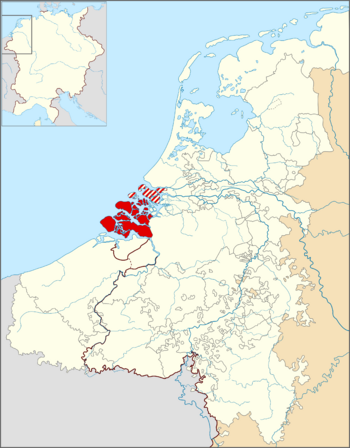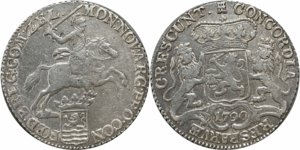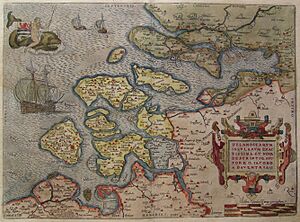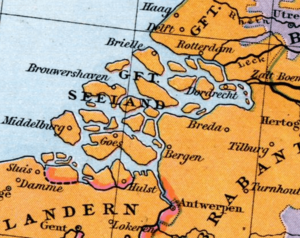County of Zeeland facts for kids
Quick facts for kids
County of Zeeland
Graafschap Zeeland (Dutch)
|
|||||||||
|---|---|---|---|---|---|---|---|---|---|
| 1012–1795 | |||||||||

The County of Zeeland around 1350.
|
|||||||||
| Status | State of the Holy Roman Empire (until 1581/1648) Province of the Dutch Republic (1581/1648-1795/) |
||||||||
| Capital | Middelburg | ||||||||
| Common languages | Dutch | ||||||||
| Religion | |||||||||
| Government | Feudal monarchy | ||||||||
| Historical era | Middle Ages, Renaissance, Modern | ||||||||
|
• Established
|
1012 | ||||||||
|
• Held by Holland
|
1323 | ||||||||
|
• To Burgundy
|
1432 | ||||||||
|
• Joined Burgundian Circle
|
1512 | ||||||||
|
• Part of Dutch Republic
|
1581 | ||||||||
|
• Disestablished
|
1795 | ||||||||
|
|||||||||
The County of Zeeland (Dutch: Graafschap Zeeland) was a historic area in the Low Countries. It was like a small country ruled by a count. Zeeland was part of the Holy Roman Empire for a long time. Later, it became one of the seven provinces of the Dutch Republic.
This county covered the area around the Scheldt and Meuse rivers. This is roughly where the modern Dutch province of Zeeland is today. However, the old County of Zeeland did not include Zeelandic Flanders. This area was part of Flanders. Also, the modern province of Zeeland does not include Sommelsdijk. This town was historically part of the County of Zeeland.
Contents
History of Zeeland County
Zeeland was often influenced by its stronger neighbors. These were the County of Holland, the County of Hainaut, and the County of Flanders.
Early Control and Conflicts
In 1012, Emperor Henry II gave Zeeland to Baldwin IV of Flanders. This meant one person ruled both Flanders and Zeeland. This type of rule is called a personal union. However, Holland often disagreed with this arrangement.
A war started between the counties in 1167. After this war, Floris III of Holland had to accept that the Count of Flanders was in charge of Zeeland. But later, Floris IV of Holland (1222-1234) won Zeeland back. From 1256, Zeeland was ruled in a personal union by the counts of Holland. This began with Floris V.
Becoming Part of Larger Powers
In 1323, the Treaty of Paris was signed. In this treaty, Flanders gave up its claims on Zeeland. It recognized the Count of Holland as the Count of Zeeland. Even so, Zeeland stayed a separate area for government. It was still managed by the counts of Holland.
In 1432, Philip the Good, a duke from Burgundy, took control of Zeeland. It became part of the Burgundian Netherlands. After Mary of Burgundy died in 1482, Zeeland became one of the Seventeen Provinces. These provinces were held by the House of Habsburg. In 1512, Zeeland joined the Burgundian Circle.

Zeeland in the Dutch Republic
After the Eighty Years' War, Zeeland became one of the United Provinces. These provinces formed the Dutch Republic in 1581. Before and after Dutch independence, Zeeland shared some government bodies with Holland. For example, they shared the highest court.
The States-General of the Netherlands first met in Middelburg in 1583. From 1585, they met in The Hague. The County of Zeeland stopped being a separate state in 1795. This happened when the Batavian Republic was formed. Zeeland became a new type of region called a 'département'. Today, Zeeland and Zeelandic Flanders together form the modern province of Zeeland.
Rulers of Zeeland Over Time
Here's how Zeeland was ruled through history:
| Counts of Flanders | 1012–1167 | |
| Shared rule by Counts of Flanders and Holland | 1167–1256 | |
| Counts of Holland and Zeeland | 1256–1572 | |
| States of Zeeland (local government) | 1572–1795 |
Important Cities in Zeeland County
Some cities in the County of Zeeland had a special role. They could vote in the local government, called the States of Zeeland. Here are some of them, listed by their importance at the time:
- Middelburg (received city rights in 1217)
- Zierikzee (received city rights in 1248)
- Reimerswaal (received city rights in 1374) – it voted in the States of Zeeland until 1574.
- Goes (received city rights in 1405)
- Tholen (received city rights in 1366)
- Vlissingen (received city rights in 1315) – it started voting in the States of Zeeland from 1574.
- Veere (received city rights in 1355) – it started voting in the States of Zeeland from 1574.
Smaller Towns in Zeeland
These towns were also part of the county but did not have a seat in the States of Zeeland:
- Arnemuiden (received city rights in 1574)
- Brouwershaven (received city rights in 1477)
- Domburg (received city rights in 1223)
- Kortgene (received city rights in 1431)
- Sint Maartensdijk (received city rights in 1491)
- Westkapelle (received city rights in 1223)
See also
- Count of Holland
 | Dorothy Vaughan |
 | Charles Henry Turner |
 | Hildrus Poindexter |
 | Henry Cecil McBay |




